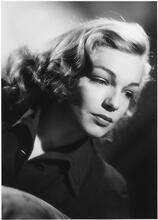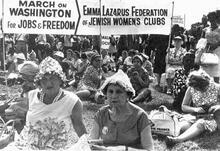Melanie Kaye/Kantrowitz
Melanie Kaye/Kantrowitz was a lesbian-feminist writer and editor born in Brooklyn. She attended City College in New York and the University of California–Berkeley. As a noted activist and writer, she made multiple theoretical contributions to understanding Judaism, lesbianism, and feminism as intersectional identities, extended an awareness of class and economic justice through a Jewish lens, and made visible racial differences within Jewish communities. Kaye/Kantrowitz was the founding executive director of Jews For Racial and Economic Justice and served as a board member for nearly a decade. She advocated Radical Diasporism as a progressive alternative to Zionism.
Family and Education
Melanie Kaye/Kantrowitz was born on September 9, 1945, in the Flatbush section of Brooklyn, New York, to Milton and Violette Kaye, who had family roots in Poland and Russia. Before Melanie and her older sister Roni were born, Milton changed the family name from Kantrowitz to Kaye. (Melanie would later adopt the naming convention Kaye/Kantrowitz; see below.) Milton owned a women’s clothing store with his sister, where Violette also worked. While not religiously observant, the Kayes had a strong Jewish identity expressed through solidarity with Julius and Ethel Rosenberg, labor unions, and anti-McCarthyism. From an early age, Kaye/Kantrowitz spoke up and spoke out.
At the age of seventeen, Kaye/Kantrowitz went to City College of New York (CCNY), where she earned a bachelor of arts degree in 1966. CCNY is in Harlem, a vital artery in the then-thriving civil rights movement, with radical and transformative visions coupled with practical reforms. Kaye/Kantrowitz became a tutor with the Harlem Education Project. During the early 1960s, she also participated in anti-war and anti-nuclear protests. Civil rights work led her to activism for racial justice, anti-war organizing, then feminism and the struggle for lesbian rights. Kaye/Kantrowitz braided of all of these activisms with progressive Judaism to weave the tapestry of her life.
Women’s Movement Activism
In 1966, Kaye/Kantrowitz left New York to study comparative literature at the University of California–Berkeley. At Berkeley, amid the excitement and energy of the Women’s Liberation Movement, she explored feminism. She linked professional and activist work by developing and teaching the first women’s studies class at Berkeley, among the first in the nation. She read widely and engaged in student-based activism as the militant anti-war movement grew.
In 1972, after completing her PhD, Kaye/Kantrowitz moved to Portland, Oregon, where she taught and worked within the vibrant feminist community. She engaged in many of the forms of cultural and literary activism that characterized feminism during this period. She wrote poetry, worked at battered women’s shelters, organized take back the night marches to name and end sexual violence, and was involved in other feminist activities. In Portland, Kaye/Kantrowitz also came out as a lesbian. Her time in Portland culminated with her first book, We Speak in Code, published by Motheroot Publications. This collection features both poetry and prose, as well as hybrid works including feminist performance pieces used at political demonstrations.
In 1979, Kaye/Kantrowitz left Portland and spent a summer in Maine, where she explored her “interest in Jewish immigrant history” and her “obsession with the Holocaust” (Issue, 96). In Maine, she encountered visible swastikas in the community, a chilling reminder of the growing antisemitism. That fall she moved to northern New Mexico; her two-year sojourn there corresponded with a period of revelation about the significance for her of connections with Jewish communities. She wrote that she “read avidly, vaguely aware that I needed Jews but feeling as out of place as ever with those who’d received religious education” (Issue). She leaned into those feelings of discomfort to understand their lessons. Her writing from this period maps her emerging consciousness as a secular Jew in feminist and lesbian contexts. Consciousness-raising experiences with feminism and lesbianism now expanded to include her new perspectives on her Jewish identity.
In the 1980s, Kaye/Kantrowitz’s work centered on a variety of projects at this nexus of feminist, lesbian, and Jewish identity. She continued to teach, as she did throughout her career, at schools including Norwich University, Goddard College, Hamilton College, Brooklyn College, and Queens College, as well as engaging in literary activist work.
Writer and Editor
Kaye/Kantrowitz was one of the nearly two dozen contributors to the 1982 book Nice Jewish Girls: A Lesbian Anthology, edited by Evelyn Torton Beck. Nice Jewish Girls includes her iconic essay, “Some Notes on Jewish Lesbian Identity,” and a poem, “Notes of an Immigrant Daughter: Atlanta.” “Some Notes,” written while she lived in Santa Fe, explores Jewish identity through the lens of feminism and lesbianism. Here she explains the lineage of her own name: “My father’s name is Kantrowitz, my mother’s Wolfgang. . . . He changed his name to Kaye just before the first child—my sister—was born in 1942…. My father says everyone called him Mr. K anyway…because Kantrowitz was too long, too hard to say” (Issues, 80). As the essay unfolds, she challenges this difficulty and invites readers to consider what it means to sound—and look—like a Jew. Shortly after publication, her own resistance to assimilation in her writing and her life led her to adopt the name Kaye/Kantrowitz.
Nice Jewish Girls prompted new activist formations. With six other Jewish lesbians—Evelyn Beck, Gloria Greenfield, Irena Klepfisz, Adrienne Rich, Bernice Mennis, and Nancy Bereano—Melanie Kaye/Kantrowitz, formed the group Di Vilde Chayes, Yiddish for “the wild beasts.” Di Vilde Chayes was both a consciousness-raising group, where members grappled with difficult topics regarding Jewish lesbian identity, and a base for activism. Collectively, the women of Di Vilde Chayes named antisemitism in the feminist movement and the lesbian movement as a cause of Jewish invisibility. Conversations among members galvanized action, including a high-profile conflict with Women Against Imperialism that played out on the pages of off our backs, the radical feminist newspaper based in Washington, DC (Antler, 307-310). Di Vilde Chayes suspended its activities in 1983, but many of its members, including Kaye/Kantrowitz, continued activist work in progressive Jewish circles, including Palestinian solidarity and work to challenge and reconfigure Zionism.
During the winter of 1984, Kaye/Kantrowitz and her partner Michaele Uccella moved to Rockland, Maine, where they became editors of Sinister Wisdom, a multicultural lesbian journal of literature and art. Kaye/Kantrowitz and Uccella succeeded Adrienne Rich and Michelle Cliff as editors of the journal, which had been founded in 1976. They edited only one issue of the journal together, and Kaye-Kantrowitz’s sojourn in Maine was brief. She moved alone to Vermont later in 1984 for a full-time teaching job at Goddard College. Kaye/Kantrowitz edited seven more issues with a community of volunteers. This was a generative and creative period for her.
In 1984-1985, Kaye/Kantrowitz and Irena Klepfisz forged a significant collaboration: editing a new Jewish feminist anthology. Together, they traveled to Israel to meet other Jewish feminists and find material for the anthology. The period after the publication of Nice Jewish Girls was tumultuous as a result of the 1982 Israeli invasion of Lebanon. Kaye/Kantrowitz described the invasion as “an event which had a profound effect on American Jews, as on Israelis. And it had its impact on the women’s movement as well, fueling anti-Semitism and dividing Jewish opinion” (Introduction to Tribe of Dina, 7). With international events as a backdrop and their new relationships with Israeli feminists, Kaye/Kantrowitz and Klepfisz assembled The Tribe of Dina to explore histories of Jewish women, contemporary cultural concerns of secular Jewish women, the stories of Israeli women, and modes of activism and engagement to challenge antisemitism in feminist and lesbian communities and in the United States at large. Originally published as Sinister Wisdom 29/30, The Tribe of Dina, like many anthologies in the 1980s, was profoundly influential; Jewish feminists embraced it. In 1989, when the original edition from Sinister Wisdom sold out, Beacon Press reissued it. During the summer of 1987, Kaye/Kantrowitz passed Sinister Wisdom to Elana Dykewomon and turned her attention to teaching, her own writing, and new forms of organizing.
Radical Diasporism
Throughout the 1980s and 1990s, Kaye/Kantrowitz braided her consciousness and public persona with multiple identities: secular, activist, Jewish, lesbian, feminist, anti-racist. Between 1990 and 2007, she published her most influential works: My Jewish Face and Other Stories (1990), a short story collection; The Issue is Power (1992), a gathering of essays and speeches; and The Colors of Jews (2007), her analysis of the multiracial aspects of Judaism and prospects for Jews to be effective and robust allies in anti-racist work. Her writing built on her lived experiences and connected intimately with her activism.
In addition to her editorial work, during the 1980s Kaye/Kantrowitz served as co-chair of the New Jewish Agenda Task Force on Anti-Semitism and Racism. In 1990, she moved to New York City to become the first Executive Director of Jews For Racial and Economic Justice (JFREF), a post she held until 1995; she then served on the JFREJ board of directors through 2004 and co-founded Beyond the Pale: The Progressive Jewish Radio Hour on WBAI. In New York, Kaye/Kantrowitz met her beloved partner, activist and organizer Leslie Cagan. She also worked as the director of the Queens College Worker Education Extension Center and taught in urban studies and Jewish studies at Brooklyn College and Queens College.
From her lifetime of activist work, Kaye/Kantrowitz formulated a theory of Radical Diasporism, explicated in her final book, The Colors of Jews. Radical Diasporism is a political analysis of Jewish identity that embraces Jewish tradition, culture, and experience with a commitment to the paradox of “cultural integrity and multicultural complexities.” She explained that Radical Diasporism depends “not on dominance but on balance, perpetual back and forth, home and away, community and outside.” Through Radical Diasporism, she advocated that Jews “make home where we are” with critical and transformative engagements with justice. By emphasizing home and rootedness in the Diaspora and rejecting Zionism, Kaye/Kantrowitz situated Radical Diasporism as a progressive alternative to Zionism. It is her final theoretical contribution as a Jewish feminist lesbian thinker, building on her important previous articulations linking Judaism, lesbianism, and feminism as intersectional identities, extending an awareness of class, racial and economic justice through a Jewish lens, as well as making visible racial differences within Jewish communities.
Melanie Kaye/Kantrowitz died on July 10, 2018, from complications of Parkinson’s Disease; Cagan, her partner of twenty-one years, survived her.
Selected Works by Melanie Kaye/Kantrowitz
We Speak in Code. Pittsburgh: Motheroot Publications, 1980.
Tribe of Dina. Sinister Wisdom, 1986; Boston: Beacon Press, 1989.
My Jewish Face and Other Stories, San Francisco: Spinsters/Aunt Lute Book Co., 1990.
The Issue is Power: Essays on Women, Jews, Violence and Resistance. San Francisco: Aunt Lute Books, 1992.
The Colors of Jews: Racial Politics and Radical Diasporism. Bloomington, IN: Indiana University Press, 2007.
Antler, Joyce. Jewish Radical Feminism: Voices from the Women’s Liberation Movement. New York: New York University Press, 2018.
Kaye/Kantrowitz, Melanie, and Irena Klepfisz. “Introduction,” Sinister Wisdom 29/30: Tribe of Dina (1986).
Kaplan, Esther, Marilyn Kleinberg Neimark, Donna Nevel, Alisa Solomon. “Melanie Kaye/Kantrowitz, 1945-2018.” Jewish Currents. https://jewishcurrents.org/melanie-kaye-kantrowitz-1945-2018/ (Accessed June 3, 2021).
Salam, Maya. “Melanie Kaye/Kantrowitz, Feminist, Activist, and Author, Dies at 72.” The New York Times, August 13, 2018. https://www.nytimes.com/2018/08/13/nyregion/melanie-kaye-kantrowitz-dead.html (Accessed June 3, 2021).














